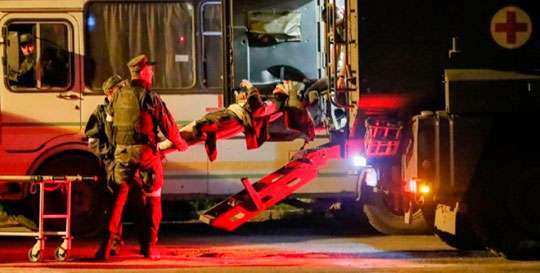Hundreds of Ukrainian fighters, many seriously wounded, ended their weeks-long defense of a besieged steel plant in the strategic port city of Mariupol, and were taken to Russian-controlled territory Monday – but hundreds remained trapped in the plant as delicate negotiations continued.
“Ukraine needs Ukrainian heroes alive,” President Volodymyr Zelensky said in his nightly address, as the delicate operation took place. “We hope that we will be able to save the lives of our guys. Among them are the seriously wounded. They are being provided with medical aid.”
Russia’s Ministry of Defense portrayed the exit of 264 Ukrainian soldiers from the Azovstal steel plant as a surrender and Russian victory. To Ukrainian officials, the fighters were heroes whose desperate last stand changed the course of the war, by tying up Russian forces for weeks in the battle for Mariupol, preventing them from sweeping across southern Ukraine.
Russia won effective control of Mariupol weeks ago, securing a crucial land bridge from Russia to Crimea, the Black Sea peninsula it annexed in 2014. But fate of fighters trapped in tunnels under the steel plant became a desperate symbol of Ukraine’s will to fight and die for their land, a key factor in Ukraine’s military successes against Russia’s larger, more powerful army.
Mariupol’s Azovstal Iron and Steel Works and its network of underground tunnels served as a shelter and final foothold for hundreds of Ukrainian fighters, including many from the controversial far-right Azov Regiment, as well as trapped civilians.
They were holed up in the facility for weeks under an intense Russian assault, before all women, children and elderly people were evacuated under an agreement earlier this month. Those who made it to safety described a brutal siege in cold and fetid bunkers, where they lived without sunlight as food and water supplies dwindled.
Putin’s involvement in the Azovstal siege underscored his increasingly hands-on role in decisions on the war, after he last month declared victory in Mariupol and ordered Russian Defense Minister Sergei Shoigu to seal the steel plant so “that even a fly could not get through.”
Kremlin spokesman Dmitry Peskov said Tuesday the fate of Ukrainian fighters had been raised in numerous phone calls to President Vladimir Putin, adding that the president said those who surrendered could leave, guaranteeing that their treatment would be “consistent with the respective international laws.”
The bombardment of the Azovstal plant appears to have persisted in recent days. Videos posted to Telegram by local officials over the weekend showed white, brightly burning munitions raining down on the plant. The type of munitions could not be independently verified, but a British military expert told Reuters it looked like an attack with phosphorus or incendiary weapons.
Under Monday’s agreement, dozens of buses were seen leaving the plant in an evacuation coordinated with the help of the United Nations and the International Committee of the Red Cross.
Ukraine’s deputy defense minister, Anna Malyar, said 53 seriously wounded soldiers were taken to a hospital in Novoazovsk, a nearby town controlled by Russian-backed separatists. An additional 211 were transported to another Russian-aligned village, Olenivka, she said. Ukrainian officials said they are seeking to broker a prisoner swap to secure their release.
“After their condition stabilizes, we will exchange them for Russian prisoners of war,” Ukrainian Deputy Prime Minister Iryna Vereshchuk said Tuesday.
While it was unclear how many were still inside Azovstal, Ukrainian presidential adviser Mykhailo Podolyak said negotiations on extracting the remaining troops were very difficult but ongoing. “There is definitely hope,” he said in a televised interview. Ukrainian authorities said last week that nearly 1,000 holdout fighters were in the plant.
Moscow said the evacuation from the Mariupol facility followed an order from the Ukrainian military command for its troops to surrender.
Despite Peskov’s claim that the combatants would be treated in line with international law, Vyacheslav Volodin, speaker of the Russian State Duma, or lower house of parliament, said Ukrainian “Nazi criminals” should not be part of any prisoner exchange while a lawmaker proposed banning a swap.
Losing Mariupol is a significant setback for Kyiv. It allows Russia to establish a vital land bridge between Crimea, the peninsula it annexed from Ukraine in 2014, and Russian-controlled territories in Ukraine’s east.
The battle for Mariupol, one of the war’s bloodiest, has drawn global attention. Russia laid waste to much of the southeastern city on the Sea of Azov, which had a fast-growing population of about 450,000 before the invasion. The offensive cut off water and electricity and reduced much of Mariupol to rubble.
Ukraine’s military leaders hailed the fighters in the city for keeping Russian forces at bay long enough to buy crucial time for troops fighting elsewhere, and Podolyak credited them with changing “the course of the war.” Russia has yet to make significant gains in eastern Ukraine, where it has concentrated its resources for weeks.
“We got the critically needed time to build reserves, regroup forces and get help from partners,” Ukraine’s military command said in a Monday update.
“Mariupol defenders are heroes of our time,” it said. “They are forever in history.”



